Have
you ever eaten scrapple? Or a turducken? We take a look at some of the
world's most strangely-named foods and how they got their names.
Cullen skink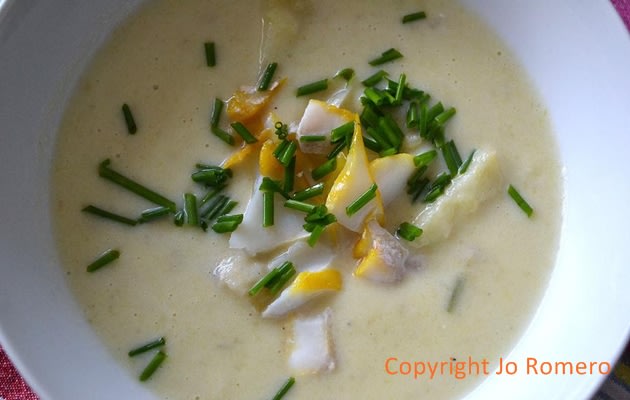 Cullen skink smoked fish soup
Cullen skink smoked fish soupIf you didn't know this was a food, you might be mistaken for thinking it's the name of an obscure, slinky, river mammal. Originating in Scotland, Cullen skink is a creamy soup, made by simmering smoked fish (traditionally haddock, but other types have been used) with potatoes, leeks, milk and onions. It's named after the coastal town that created it — Cullen, in Moray. The word 'skink' has been attributed to the Gaelic word for 'essence' or 'soup'.
Scrapple
Sounds fruity, yes? Well it isn't. Scrapple is actually pork scraps and offcuts that have been mixed with a binder, such as cornmeal — and then formed into a loaf shape. Slices of the scrapple loaf are cut off and then fried before being served. Scrapple is popular in some parts of the United States, having been brought over by Dutch immigrants to Pennsylvania. The name is thought to have come from the name of the dish in German ("panhas") and the word "kröppel", which means slice. So, over the years, "Panhas-kröppel" became "scrapple". Or that's the theory, anyway.
Fluffernutter
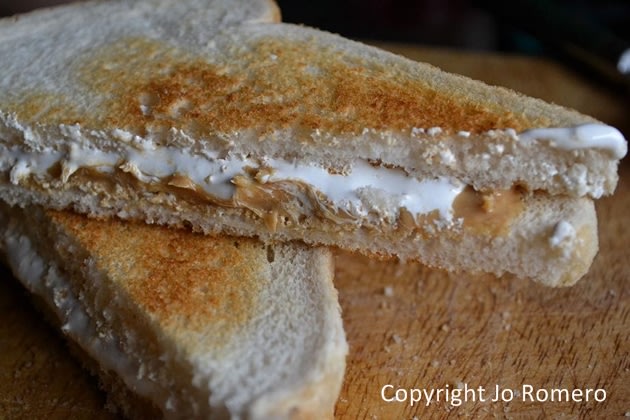 Fluffernutter
Fluffernutter
This one sounds like fun, and it is, if you have a sweet tooth. It's a sandwich made from two slices of bread (or toast) - one slice spread with peanut butter and the other with marshmallow fluff, before being pressed together. The name is just a combination of the two main ingredients. In the US, they even celebrate their own 'Fluffernutter Day' in homage to the sandwich on 8th October each year.
Sussex pond pudding Fluffernutter
FluffernutterThis one sounds like fun, and it is, if you have a sweet tooth. It's a sandwich made from two slices of bread (or toast) - one slice spread with peanut butter and the other with marshmallow fluff, before being pressed together. The name is just a combination of the two main ingredients. In the US, they even celebrate their own 'Fluffernutter Day' in homage to the sandwich on 8th October each year.
The name of this dish conjures up images of algae and lily pads, but it's really much more delicious than that. It's a traditional British steamed pudding, made from suet pastry filled with lemon slices, or sometimes a whole lemon. During cooking, the lemon peel softens, and the juices and sugars spill out when it's cut. This creates a citrussy 'pond' around the pudding, which gives the dish its name. Recipes for the pud were popular in the south east and date from at least the early 1900s.
Turducken
Don't giggle. This word is a combination of the words turkey, duck and chicken: a three-bird roast. It's popular in the US, where it's cooked to celebrate special occasions, such as Christmas and Thanksgiving. To make it, a boned chicken is stuffed into a boned duck, which is then stuffed into a turkey. It's all sewn up and roasted for around three and a half hours.
[Related article: 10 foods that have been banned]
Succotash
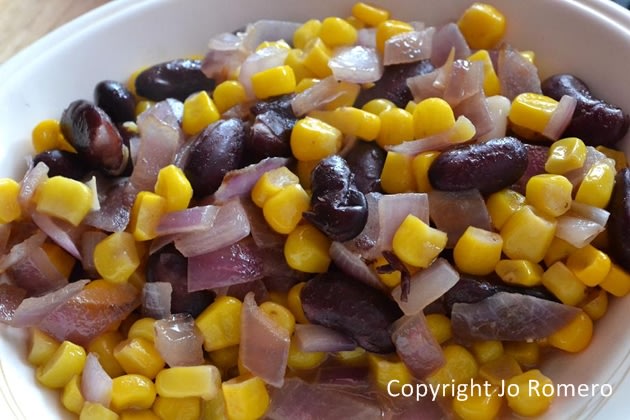 Succotash
Succotash
Not just an exclamation made famous by cartoon character Sylvester the Cat, (as in "sufferin' succotash"), it's also a bean and sweetcorn stew, believed to have been cooked by Native American Indians. Traditionally it's made with lima beans, which are similar to broad beans, but nowadays kidney beans or haricot beans are often used. And the name? According to author Harlan Walker, the Native Indians called it 'msakwitash', meaning "whatever was in the pot at a particular time." Over the years, it became distorted to the more easily-pronounced 'succotash'.
 Succotash
SuccotashNot just an exclamation made famous by cartoon character Sylvester the Cat, (as in "sufferin' succotash"), it's also a bean and sweetcorn stew, believed to have been cooked by Native American Indians. Traditionally it's made with lima beans, which are similar to broad beans, but nowadays kidney beans or haricot beans are often used. And the name? According to author Harlan Walker, the Native Indians called it 'msakwitash', meaning "whatever was in the pot at a particular time." Over the years, it became distorted to the more easily-pronounced 'succotash'.
Baba ganoush
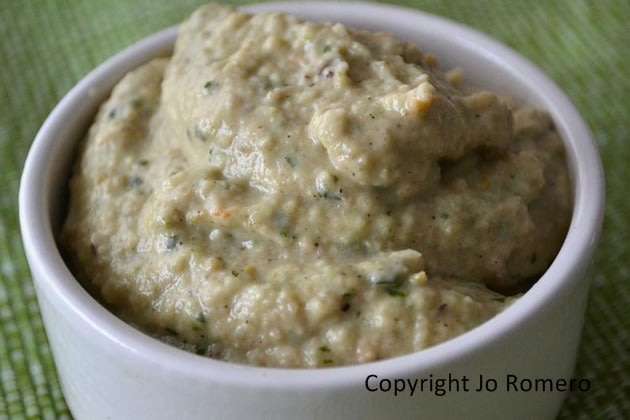 Baba ganoush
Baba ganoush
With a name like this, you'd expect this dish to be complicated and very exotic. In fact, it's just a pureé of charred aubergine, tahini (sesame seed paste) and garlic. It comes from the Middle East, where it is enjoyed on a mezze platter, for people to dunk their flatbreads into. The Oxford Dictionary suggests that 'baba' means 'father' in Egyptian Arabic, and 'ganoush' could actually be derived from a family name, implying that it could have been passed down from an ancient family recipe.
Pan haggerty
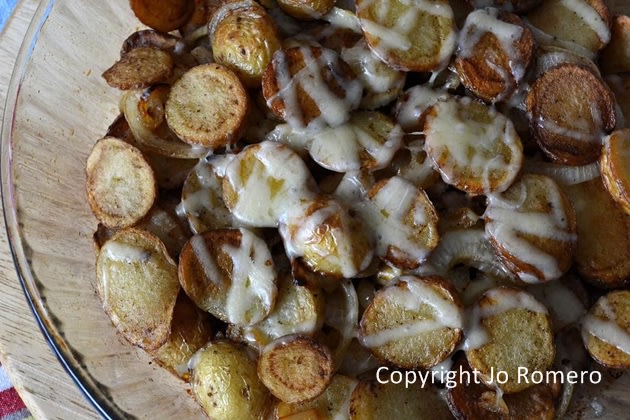 Pan haggerty potatoes onions
Pan haggerty potatoes onions
Popular in the North East of England, pan haggerty is a layered dish of potatoes and onions. A layer of sliced potatoes are fried in butter, and then onions and the remaining potatoes are layered on top. The whole lot is baked in the oven for just under an hour, until the potatoes are soft.
Finally, it's sprinkled with grated cheese before serving. It's a
cheesy, cheap and comforting dish. The word 'haggerty' is thought to be
an old English word for something that has been chopped or minced and
the Information Britain website suggest that it could be derived from
the French word 'hache', meaning to chop. Baba ganoush
Baba ganoushWith a name like this, you'd expect this dish to be complicated and very exotic. In fact, it's just a pureé of charred aubergine, tahini (sesame seed paste) and garlic. It comes from the Middle East, where it is enjoyed on a mezze platter, for people to dunk their flatbreads into. The Oxford Dictionary suggests that 'baba' means 'father' in Egyptian Arabic, and 'ganoush' could actually be derived from a family name, implying that it could have been passed down from an ancient family recipe.
Pan haggerty
 Pan haggerty potatoes onions
Pan haggerty potatoes onionsPopular in the North East of England, pan haggerty is a layered dish of potatoes and onions. A layer of sliced potatoes are fried in butter, and then onions and the remaining potatoes are layered on top. The whole lot is baked in the oven for just under an hour, until the potatoes are soft.
What other foods have been given strange names? Would the name of a food ever put you off eating it?
Source